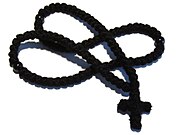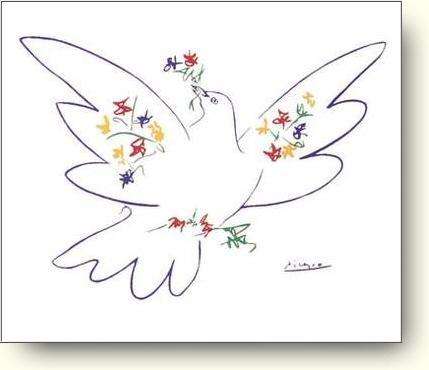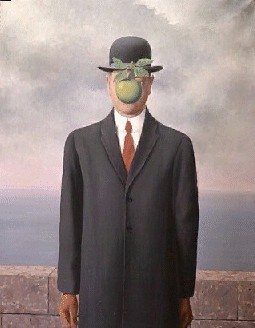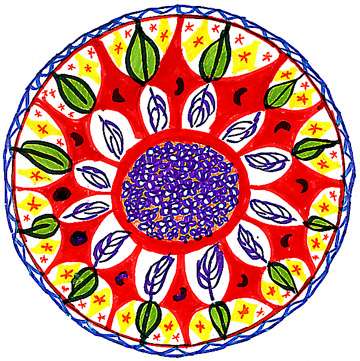Don't do daily prayers like a bird
pecking, moving its head
up and down. Prayer is an egg.
Hatch out the total helplessness inside.
~~Rumi
Source: translated by Coleman Barks
 |
| Rumi quote is from Inward/Outward. Subscribe here. |
Don't do daily prayers like a bird
pecking, moving its head
up and down. Prayer is an egg.
Hatch out the total helplessness inside.
~~Rumi
Source: translated by Coleman Barks
 |
| Rumi quote is from Inward/Outward. Subscribe here. |


"All day long a little burro labors, sometimes with heavy loads on her back and sometimes just with worries about things that bother only burros. And worries, as we know, can be more exhausting than physical labor. Once in a while a kind monk comes to her stable and brings a pear, but more than that, he looks into the burro's eyes and touches her ears and for a few seconds the burro is free and even seems to laugh, because love does that: Love offers freedom."


Cartoon by Dave Walker. Find more cartoons you can freely re-use on your blog at We Blog Cartoons.
Think of all the bottles to cast aside so that the wind of Grace can more easily blow us across the sea of life to the One, as described in The Spiritual Life.
In the latest book by Ruth Burrows that I read, the author emphasized that our job in prayer is to receive God's love. It is not what we do, but what God is always doing--"prayer is essentially what God does, how God addresses us, looks at us." (1) ". . . we must realize that what we have to do is allow ourselves to be loved, to be there for Love to love us." (3)
Ruth Burrows, an English Carmelite nun, has written books about mystical prayer, John of the Cross, and Teresa of Avila.I found much in her Essence of Prayer to be emphasizing the Roman Catholic and Carmelite way of life, which became understandable when I discovered that each chapter was a separate essay that had been published in various periodicals between 1982 and 2001. However, it was interesting to read about saints who had been in and/or associated with the Carmelite order: Teresa of Avila, John of the Cross, Therese of Lisieux, and Elizabeth of the Trinity.
This is the spiritual life--with the parts of my ego that must be tossed aside so I can rest in God's Love.
The grace of God is a wind which is always blowing.
– Sri Ramakrishna
"All that you and I have to do is to put up our sails and let the wind of grace carry us across the sea of life to the other shore. But most of us are firmly stuck on this shore. Our sail is torn and our boat is overloaded with excess baggage: our likes and dislikes, our habits and opinions, all the resentments and hostilities which we have acquired.
"But just as it is we, ourselves, who have acquired this baggage, it is we who can gradually learn to toss it overboard. The wind is blowing, but we have to make our boat seaworthy. We can patch up our sail, and unfurl it to catch the wind that will carry us to the other shore."
~~Eknath Easwaran
The Thought for the Day is today's entry from Eknath Easwaran's Words to Live By. (Copyright 1999 and 2005 by The Blue Mountain Center of Meditation.)
Select the Thought for the Day for any day of the year.


Time erased
By life-giving water,
Offered by a man who had no bucket,
Who knew me not, yet knew me well.
My past washed clean
In the spring that I became —
Flowing, flowing through me,
God's instrument.
Never again shall I thirst.
| Jesus and the Samaritan Woman | |
| Dr. He Qi is a professor at the Nanjing Union Theological Seminary and a tutor for master candidate students in the Philosophy Department of Nanjing University. He is also a member of the China Art Association and a council member of the Asian Christian Art Association. | |
| Date: | 2001 |



| |

Our deepest fear is not that we are inadequate.
Our deepest fear is that we are powerful beyond measure.
It is our light, not our darkness, that most frightens us.
We ask ourselves, “Who am I to be brilliant, gorgeous, talented, and fabulous?”
Actually, who are you not to be?
Your playing small doesn’t serve the world.
There’s nothing enlightened about shrinking so that other people won’t feel insecure around you.
We were born to make manifest the glory that is within us.
It’s not just in some of us; it’s in everyone.
And as we let our own light shine, we unconsciously give other people permission to do the same.
As we are liberated from our own fear, our presence automatically liberates others.
--Marianne Williamson

No people are uninteresting.
Their fate is like the chronicle of planets.
Nothing in them is not particular,
and planet is dissimilar from planet.
And if a man lived in obscurity
making his friends in that obscurity
obscurity is not uninteresting.
To each his world is private,
and in that world one excellent minute.
And in that world one tragic minute.
These are private.
In any man who dies there dies with him
his first snow and kiss and fight.
It goes with him.
There are left books and bridges
and painted canvas and machinery.
Whose fate is to survive.
But what has gone is also not nothing:
by the rule of the game something has gone.
Not people die but worlds die in them.
-- Yevgeny Yevtushenko
This is the poem that I left on my future husband's
windshield, which I told about in the Marriage Meme.
You can tell that that was when I was in an
existentialist phase, wondering about God, which is
probably predictable in college and also because I was
dating an atheist.
There is a stage/phase/experience on the path to maturity whcih looks like an increasing awareness of moments when I take back control. At those times rather than beting myself up just smiling, turning to God and with God's help letting go again. . . and again. . . and again, gently.
Well, I'm not there. . . .But I am here wishing you a Happy Valentine's Day!
 National Shrine of St. Elizabeth Ann Seton
National Shrine of St. Elizabeth Ann Seton

![[Butter+7+pounds.jpg]](https://blogger.googleusercontent.com/img/b/R29vZ2xl/AVvXsEgj4-h_AlT9784UcP1t6e-pVucpTA2KUncjhyb5_Kiu2dGYUwOMA65G7WhlCw6K3ytVu5limuk9eff3qAKfjuMqGL6PeherNee9uGB2omv6FsGhMuoWjn3eel1KeNE0QTqLEcHcX2Y6emP-/s1600/Butter+7+pounds.jpg)
 Since it's such a small recipe, I usually quadruple it. I decided it would be a nice surprise to make a batch and mail Butterscotch Brownies to my children for Valentine's Day. After my early morning walk today, I made them, as I'm trying to get "everything" done before I leave early on Monday morning for MD.
Since it's such a small recipe, I usually quadruple it. I decided it would be a nice surprise to make a batch and mail Butterscotch Brownies to my children for Valentine's Day. After my early morning walk today, I made them, as I'm trying to get "everything" done before I leave early on Monday morning for MD.
‘There can be no denying that women and men are created equal in the image of God. Thus we must not focus on the gender roles that society, church and African cultures have assigned to women. The focus should fall on the biblical call for all human beings to discern what is the will of God in their lives.’Please reflect on Romans 12:1-8 where the apostle Paul urges both brothers and sisters to be available to God as an act of worship.
‘Women have a critical and prophetic role to play in ‘stirring the waters’ and ‘speaking the truth’ by asserting their God-given humanity and gifts – not for their own sake but for the sake of the integrity of the gospel.’Prayer
We are expecting another year with bad news due to the Niña Phenomenon (a climatic phenomenon which causes the waters of the pacific ocean to become unusually cold and as a result produces storms; in recent decades this has been the cause of major climatic disasters) and thousands of families will be affected. A recently released government report has registered 13,883 families whose houses were damaged and at least 18 people have died.* Micah Challenge Haiti is organizing a seminar on Integral Mission for all theological seminaries and bible schools in the country.
This news must call us to reflect and to mobilize as, as so often, the affected people are those with little opportunity to protect themselves. As people of God we must learn to practice justice. Let us be sure that the church is there to act with love and compassion.
Please pray for our campaign plans this year and the challenges that we face. May God in his mercy help us to be faithful in the ministry.


Since my dad was a career Marine, I liked reading Wyld's reflections on the Marines and his time in Iraq. His honest sharing and questioning captured my attention.
I am very glad he is safely home. Thank you for serving, Wyld. And welcome back!

God’s mercy is greater than our sins. There is an awareness of sin that does not lead to God but rather to self-preoccupation. Our temptation is to be so impressed by our sins and our failings and so overwhelmed by our lack of generosity that we get stuck in paralyzing guilt. It is the guilt that says, ‘I am too sinful to deserve God’s mercy.’ It is the guilt that leads to introspection instead of directing our eyes to God. It is the guilt that has become an idol and therefore a form of pride.
Lent is a time to break down this idol and to direct our attention to our loving Lord. The question is: ‘Are we like Judas, who was so overcome by his sin that he could not believe in God’s mercy . . . or are we like Peter who returned to his Lord with repentance and cried bitterly for his sins?’ The season of Lent, during which winter and spring struggle with each other for dominance, helps us in a special way to cry out for God’s mercy.
-Henri Nouwen, A Cry For Mercy
This meant so much to me over at De Die In Diem that I had to post it.



| |
Source: The Fruits of the Spirit
Go here to receive similar meditations in your inbox each day.
I constantly need this reminder! Look to the Source not at me.
 by David Arthur Neri is the picture I could not manage to post here. Scroll down under the artist's picture on the right to find this painting. David Neri wrote this about his paintings:
by David Arthur Neri is the picture I could not manage to post here. Scroll down under the artist's picture on the right to find this painting. David Neri wrote this about his paintings:
Many are doing this silly meme, but I last looked at Zorra's.
1. YOUR ROCK STAR NAME (first pet, current car): Inky Avalon
2. YOUR GANGSTA NAME (fave ice cream flavor, favorite type of shoe): Vanilla Keen
3. YOUR NATIVE AMERICAN NAME (favorite color, favorite animal): Green Cocker
4. YOUR SOAP OPERA NAME (middle name, city where you were born): Anne Bremerton
5. YOUR STAR WARS NAME (the first three letters of your last name, first two of your first name): Hilja
6. SUPERHERO NAME (2nd favorite color, favorite drink): Blue Tab
7. NASCAR NAME (the first names of your grandfathers): John George
8. STRIPPER NAME ( the name of your favorite perfume/cologne/scent, favorite candy): Rose Chocolate
9. TV WEATHER ANCHOR NAME (your fifth grade teacher’s last name, a major city that starts with the same letter): Nowell Newark
10. SPY NAME (your favorite season/holiday, flower): Fall Daffodil
11. CARTOON NAME (favorite fruit, article of clothing you’re wearing right now): Apple Jeans
12. HIPPIE NAME (What you ate for breakfast, your favorite tree): Crackers Oak
Yesterday I listened to Ronald Rolheiser give an excellent talk on Augustine. He repeated a quote from Kenneth Cragg twice to end the lecture. Of course, I wanted to find out whom this person was! However, I thought it was "Kenneth CRAIG" and so asked both MadPriest and Crimson Rambler about him when I could find nothing about this mistakenly named priest. I am grateful to MadPriest who wrote: "Perhaps you mean Bishop Kenneth Cragg who is a world renown Anglican scholar and expert on Islam. He's retired now. In fact, he must be in his mid 90s." This info led me to many more sources on google, especially an article from The Christian Century in 1999.
"Cross Meets Crescent: An Interview with Kenneth Craig" explores Christian and Islam ecumenism. I am posting the section of the article that addresses "fundamentalism" in the Islam faith.
What place does fundamentalism have within the full range of Islamic faith and practice?
This is difficult to discuss, because there is no equivalent for the word "fundamentalism" in Arabic. In one sense, Islam is inherently fundamentalist in that it understands the Qur'an to be a literal dictation to Muhammad of a book in heaven. His mental processes or personal preferences are not at all involved in the text of the Qur'an. It is simply the result of a mysterious process of inspiration or revelation that comes down upon him. The orthodox view (with which I don't agree) is that Muhammad was illiterate. That makes the text of the Qur'an all the more God's word, because it couldn't have come from Muhammad. The 13th-century mystic Jalal ed-Din Rumi gives a vivid image of Muhammad's role in transmitting the Qur'an: Muhammad is like a stone lion in a garden. Out of the lion's mouth comes a spout of water. Everyone knows that a cunning plumber has contrived a pipe to use as a conduit to conduct the water through the lion.
In Islam, the more something is of God, the less the human is needed. In contrast, the biblical view is that the more the divine is giving, the more the human is recruited. The biblical prophets are vivid personalities, not ciphers. Each has his own unique style and imagery.
But the Qur'an has been considered a literal scripture from the beginning. This is what accounts for the importance of calligraphy and recitation in Islam. One mustn't make a mistake in recitation, since one is repeating the very words of God. For most Christians, the New Testament is not that kind of writing. We see it as a book about what is antecedent to itself -- the person and work of Christ, the Word made flesh, teaching and suffering among us.
Though the Qur'an does need interpretation, Muslims don't approach it with the kind of almost overconfidence that sometimes marks Christian exegesis of the Bible. A Muslim once said to me, "You play fast and loose with your scripture." That is how Muslims react to our sense that we need to discern what the text could mean -- especially, for example, when we deal with the Gospel of John. We question whether we can accept the text as giving us the actual words of Jesus, as we think the parables do. Why do Jesus' words sound so different in the Fourth Gospel? What is John doing here? Those are legitimate questions for us, questions that are a part of the integrity of our faith. One Muslim has referred to "the liquidity of the Christian scriptures as you treat them." He says it's like the liquidity of capital -- we make it do what we want it to do.
Another factor is that Muslims understand Islam as the final religion, and Jesus as the next-to-last in a long succession of prophets. The Qur'an is the book that perfects and, if need be, corrects all previous revelation, going right back to Abraham. That gives Muslims an enormous sense of finality, which tends to preclude a will to be really critical or even investigative about what they believe.
The article gives this info about Kenneth Cragg:
Kenneth Cragg has been a major figure in Christian-Muslim conversations. He has spent some 45 years in the Middle East as professor of philosophy, as a chaplain, and as assistant bishop in the Anglican Archdiocese of Jerusalem. He has also taught at the University of Sussex in England. His published works include hundreds of scholarly articles and more than 30 books, most recently The Arab Christian and Palestine: The Prize and Price of Zion. Now in his 80s, Bishop Cragg still lectures at Oxford University and in Europe and the U.S. This interview appeared in The CHRISTIAN CENTURY, February 17, l999; copyright by the Christian Century Foundation and used by permission. This text was prepared for Religion Online by John C. Purdy.
Go here to read the rest of the article.
(What's funny is that Crimson Rambler also sent me a link to the same article I'd found! It's nice to have a resourceful blogging community!)
Also, here's a link to an article about Kenneth Cragg and his writings.
Work That Is Real
by Kayla McClurg
The pitcher cries for water to carry
and a person for work that is real.
--- Marge Piercy
When my doctor told me, in that sudden crazy phone call at Thanksgiving, that I had an urgent heart problem and needed to get to the emergency room immediately, I went, but not before walking up and then back down a flight of 15 stairs to get a book. I realize now I actually risked death to keep from sitting in the ER for hours, maybe my last hours on this good earth, with nothing to do! In my bedroom, my 'third eye' knew this might be my last time there, and it noticed two things in particular: how topsy-turvy my closet was and how many things I own that haven't fulfilled their intended purpose....
Continue reading at inward/outward

